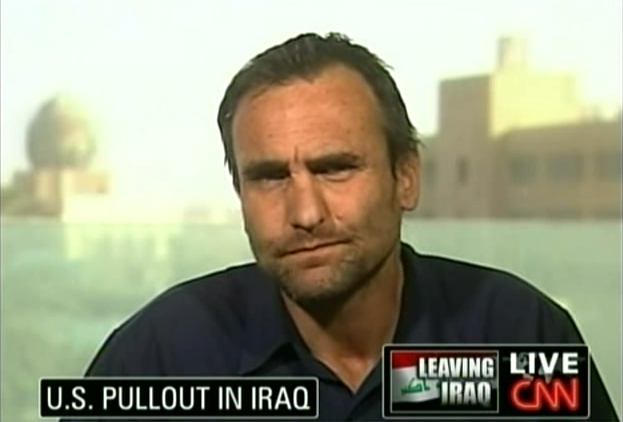AC: "I've just woken up on a Baghdad morning, and the US-led phase of the war in Iraq is over."
June 29, 2009

Length: 3:37
LARGE (41.9 MB) ----- SMALL (4.5 MB)
Boy, that title quote says it all, doesn't it? I got chills when he said it, and I loved the way he took control of the segment to make that point. It is astonishing. And it deserved recognition. There will be more blood spilled, more in-fighting, more problems... but a huge milestone has been reached for us and for the Iraqis.
ANDERSON COOPER: In Iraq, a remarkable scene to usher in a defining moment: crowds celebrating in a park in Baghdad. Cheers come as U.S. forces officially begin handing over control to the Iraqis; the deadline, June 30th, being declared a national holiday -- withdrawals happening in cities and towns across the country.
But with the security pullout we have seen a spike in terror attacks, scores have been killed in recent weeks raising fears that a war that has killed thousands is far from over.
Michael Ware is back in Baghdad; he joins us now. Michael, for the first time in six years, Iraq is responsible for security in the cities. What is the mood like on the streets?
MICHAEL WARE, CNN INTERNATIONAL CORRESPONDENT: Well, Anderson, just before we get to that, let's take a breath, and let's realize what's just happened. I've just woken up on a Baghdad morning, and the U.S.-led phase of the war in Iraq is over, six and a half long, brutal years.
There are still U.S. troops here, and there is still going to be some combat, and I'm afraid there'll probably still be some losses but what a day.
Now, we saw that last night, the Iraqis celebrating; the outpouring of excitement and joy and nationalism; families in parks, anchors on state TV draped in the Iraqi flag. But the Iraqi security forces, they are now the tip of the spear and quite frankly, they are not up to the task yet. That's why you still have 130,000 American troops still in this country.
They are now in a supporting role. They are going to have to operate only with the permission or the invitation of the Iraqi government. America can no longer wage any kind of a war of its own within the Iraqi cities themselves. In the deserts and in the Green Belt around the city they can still conduct operations but from the mood of jubilation to the continuing attacks to now that this is Iraq's war in Iraq, so much is suddenly changing -- Anderson.
COOPER: Do we know what this means, though? How will U.S. forces be used? They have to actually be called in by Iraqi forces?
WARE: Yes, pretty much.
Inside the cities, America is out of the decision-making process in terms of the fight. Now it's up to Prime Minister Maliki and his military advisers.
Now, you're still going to see some American uniforms in a few cities and a few towns. But they are going to be rare as hen's teeth, relatively. You'll see some advisors embedded with Iraqi units, the men they're still training. You'll see some partnered patrols now and then, and I'm sure there will be some joint operations from time to time. But that's about it.
Otherwise, U.S. forces must retreat or already have retreated to the pre-approved bases outside the cities and towns. They can only operate with any kind of freedom out in the deserts as I was saying. It's going to take the Iraqi prime minister to say we need you here, we need you there.
Primarily, as General Odierno, the commander here on the ground -- the American commander -- says, America now acts as enablers providing the air power, the heavy weapons, the artillery, providing those sorts of things the Iraqi forces simply are nowhere near having or being able -- those tasks that they able to perform on themselves. America takes a supporting role, mate.
COOPER: All right, Michael Ware from Baghdad. Michael thank you.
